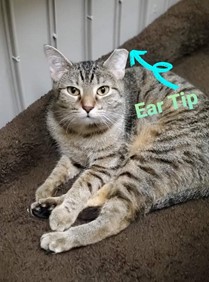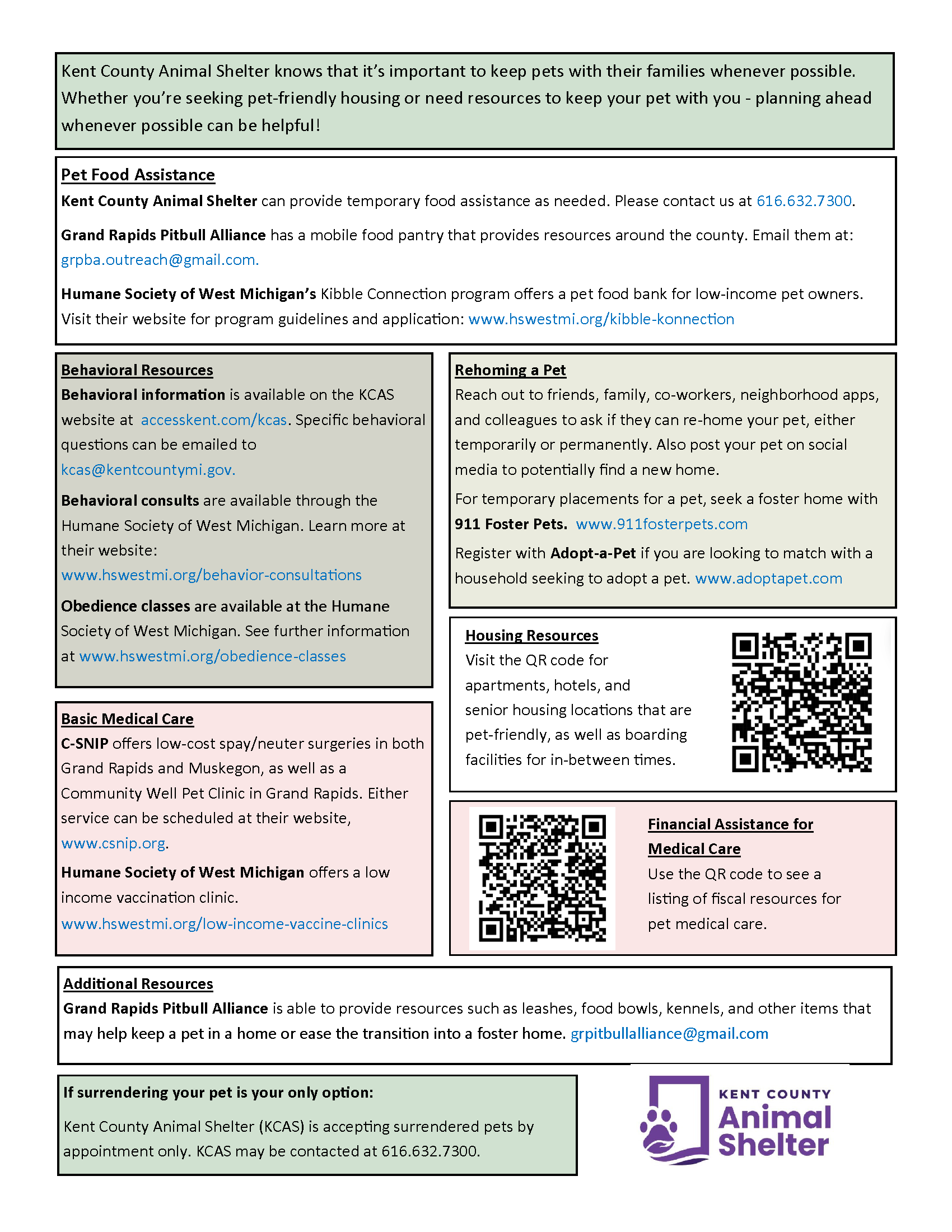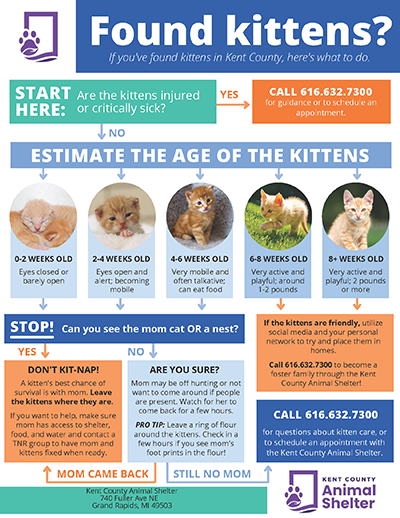Animal Shelter
Community Resources
Resources to Care for Your Pet
Kent County Animal Shelter knows that it's important to keep pets with their families whenever possible.
Whether you're seeking pet-friendly housing or need resources to keep your pet with you, planning ahead whenever possible can be helpful!
Read Our Resource GuideFood
Kent County Animal Shelter can assist with temporary food assistance as needed. Please contact us at 616.632.7300 to request food. Otherwise, please see the additional resources below.
- Grand Rapids Pitbull Alliance has a food pantry. Email them at grpba.outreach@gmail.com for additional information.
- Humane Society of West Michigan’s Kibble Connection program offers a pet food bank for low-income pet owners. Visit their site for guidelines and application.
- Pleasant Hearts Pantry – pantry is roughly every second Saturday, need photo ID & proof of address; as-needed basis, walk-in. Northern Grand Rapids.
Community Cats
What is a community cat?

Community Cats live outdoors and tend to prefer the company of other cats in the area, rather than people. Community Cats like neighborhoods where they can find food (such as trash, rodents, and insects) and shelter. These cats can live healthy, comfortable lives outside. So, if you see a cat that is ear tipped, please leave them alone, they are happy where they are, and will not reproduce!
Why is a community cat good to have in the neighborhood?
You may see a Community Cat in your neighborhood (indicated by an ear tip), and that’s OK! When Community Cats are removed from the area, this creates what is called a VACUUM EFFECT; even though the cats are gone, the food and shelter are still there, so other cats are almost guaranteed to find these goodies and move on in if it is no longer occupied. This is why Trap, Neuter, Return programs are so important!
TNR
Community Cat populations can be kept low through Trap, Neuter (or spaying), and Return (TNR). The cats are Trapped humanely, brought to a medical facility, Neutered or spayed, given a basic medical check, and often given a rabies vaccine. While the cat is sedated, the tip of their left ear is squared off for easy identification moving forward. Then, the cat is Returned to the area they were found. It is important that they can go back to the area they were trapped because that is where they know how to find food and shelter!
How to Make a Feral Cat Shelter
Courtesy of Cole and Marmalade
TNR prevents more kittens and reduces the number of new cats who are entering the territory to mate. Learn more about TNR through our friends at Alley Cat Allies.
What if there are kittens in my yard?
Before a Community Cat has been Trapped, Neutered, and Returned, there may be new litters of kittens. Please remember that mom is the best source of food and protection for these little guys! Help support these single working mothers by keeping a distant eye on the kittens until they’re about six weeks old (or about a pound and a half!); that is roughly the age of when they can be separated from mom, spayed/neutered, and can be socialized into new homes.
How to address common complaints about community cats
Community Cats can sometimes annoy their neighbors by digging in garden beds, lounging on porches, or looking through trash for food. There are humane, often EASY ways to discourage Community Cats from doing these annoying things. Scents such as citrus or coffee grounds; plastic runners or scat mats can be used to make areas less inviting to dig or rest on; and bungee cords to secure loose trash can lids. These ideas and more can be found through our friends at Alley Cat Allies.
How to get involved with community cats
Community Cats need active advocates to make sure they are staying safe, that’s where we need YOU! There are many ways to look out for our Community Cats, talk to you neighbors about them, organize a TNR program, or keep an eye out for any cats that appear in need of medical support.
Alley Cat Allies has a video that talks about how one community helps the people and cats in the neighborhood coexist peacefully. In Kent County, the Creston Cat Community has successfully been helping their neighborhood colony; if you’re interested in more information please reach out to them at catsofcreston@gmail.com! Learn more about Community Cats and their place in our neighborhoods at the KCAS website.
Housing
If your landlord has indicated that you cannot have a current pet, or if you are moving to a new home, consider the strategies outlined at this website.
Spay/Neuter
C-SNIP has a two locations; one in Grand Rapids, and another in Muskegon. Visit their website for cost and how to schedule.
Vaccinations
CSNIP offers a Community Well Pet Clinic for low-cost medical exams, vaccinations, and microchips. Visit their website for a list of services, cost, and how to schedule.
Humane Society of West Michigan (HSWM) offers low income vaccination and microchip clinics throughout the year; visit their website for guidelines and scheduling.
Your local veterinarian can provide appropriate vaccinations and implant microchips as needed.
Finally, there are often various low-cost vaccination and microchip events throughout the year. Keep an eye on social media pages for KCAS, CSNIP, and HSWM for updates.


